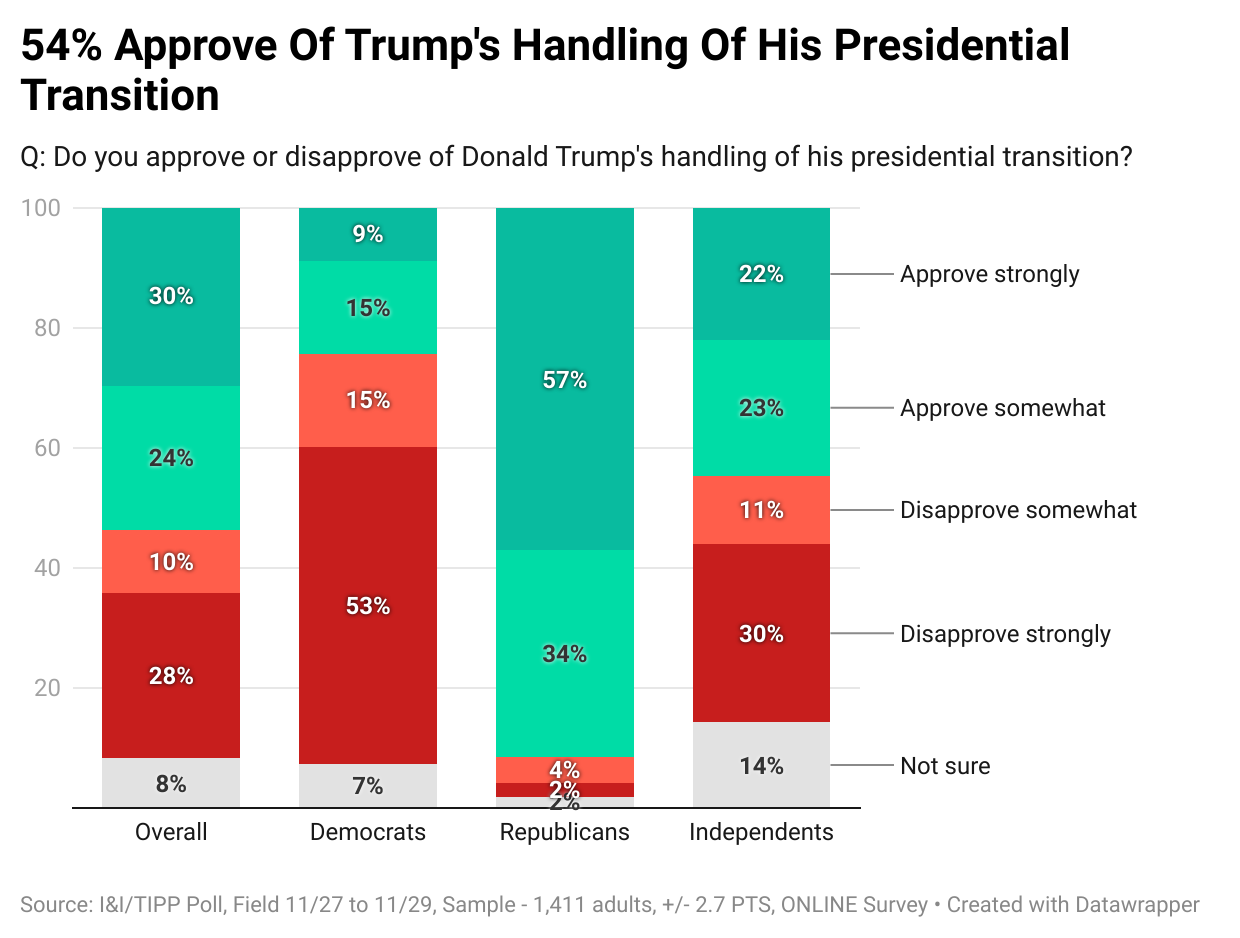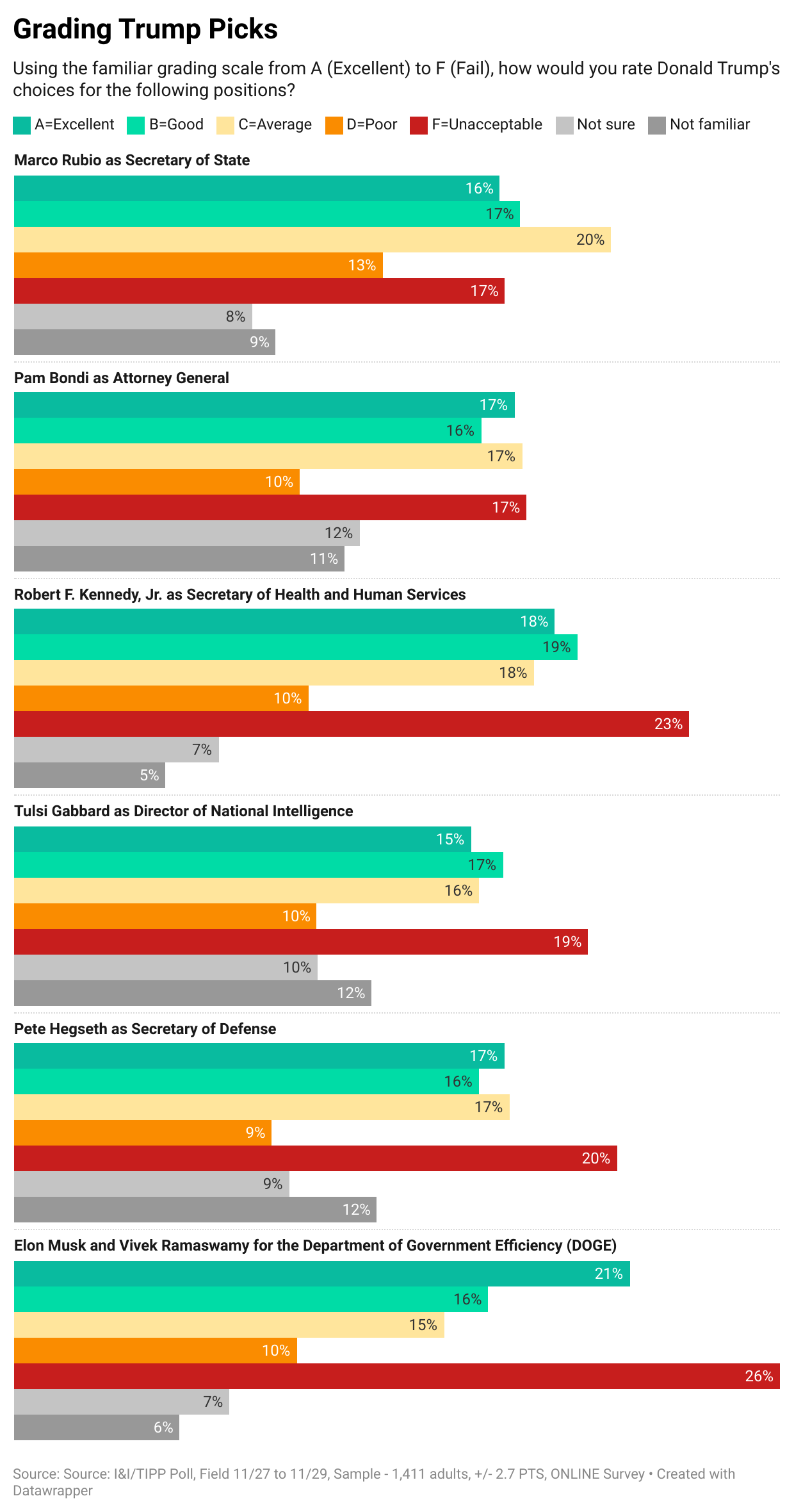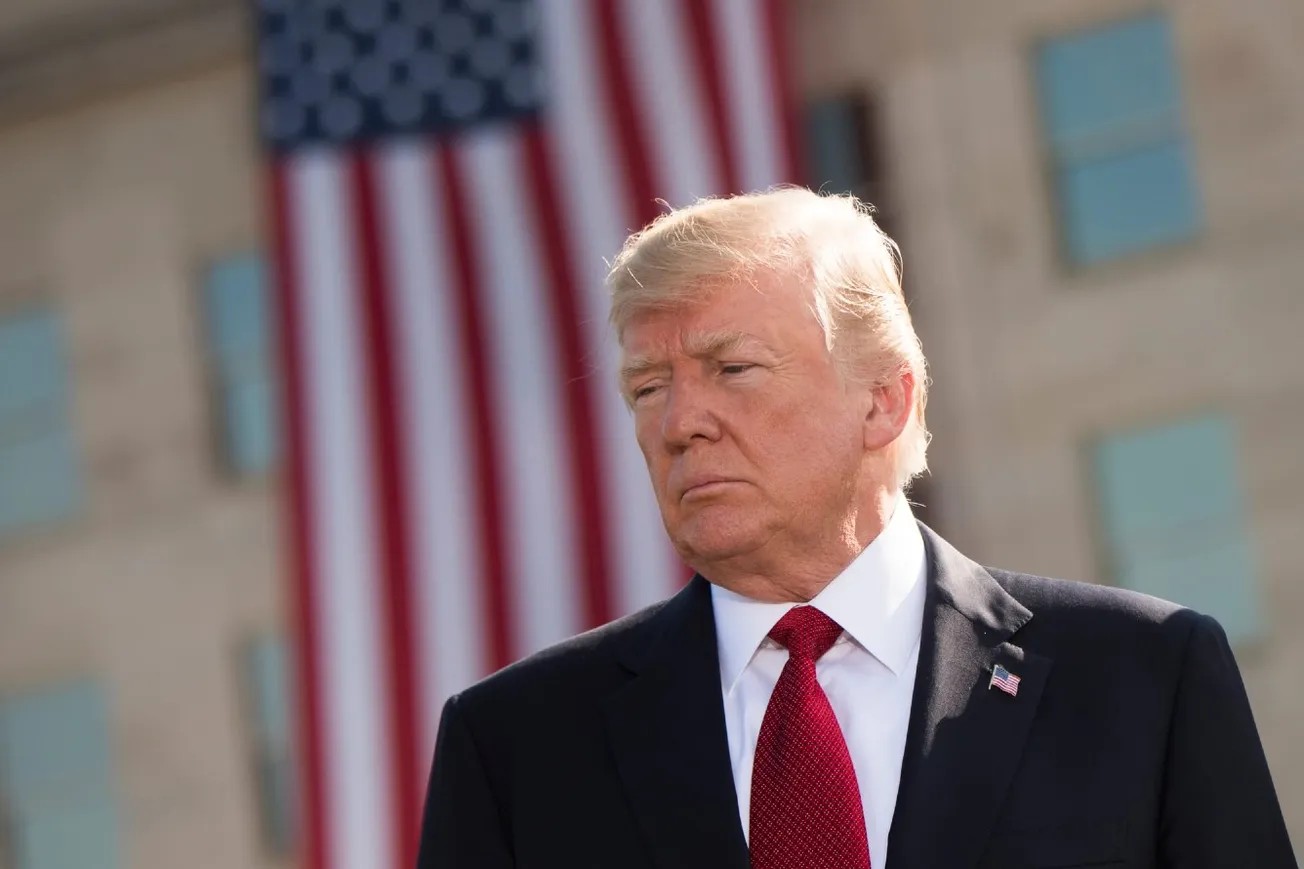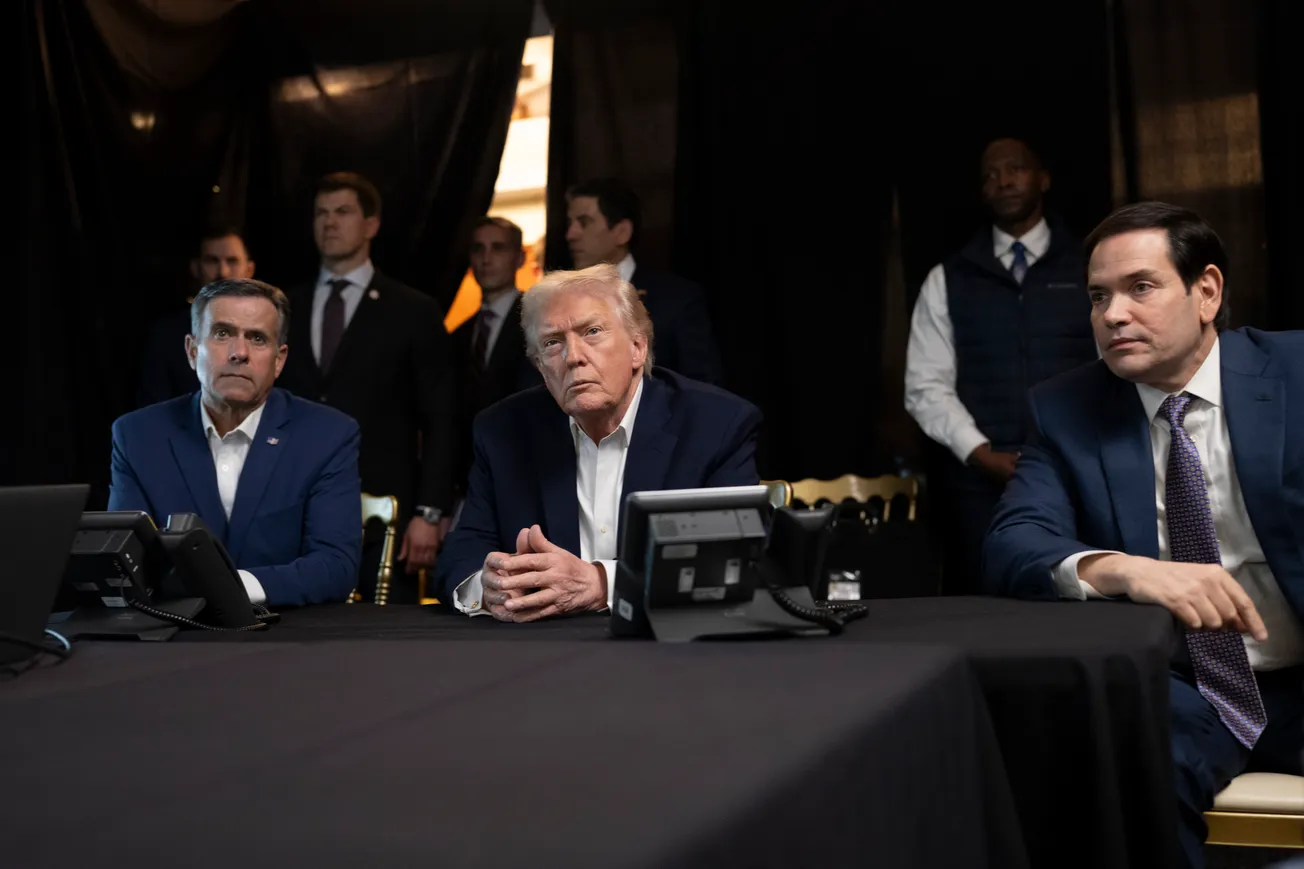Americans overall have a very favorable response to President-elect Donald Trump’s picks to staff his new administration, but they still appear to be in wait-and-see mode when it comes to some of Trump’s selections to help lead his White House. And it’s very much a political thing, the latest I&I/TIPP shows.
In the latest online national I&I/TIPP Poll, taken from Nov. 27 -29, 1,411 adult registered voters were asked the following short question: “Do you approve or disapprove of Donald Trump’s handling of his presidential transition?”
Despite the the irregular and at times bitter 2024 presidential election, a solid majority of 54% said they either “approve strongly” (30%) or “approve somewhat” (24%) of Trump’s transition and early selections to run his administration. The poll has a margin of error of +/-2.7 percentage points.
A sizable but still-smaller 38% said they either “disapprove strongly” (10%) or “disapprove somewhat” (28%), while another 8% described themselves as “not sure.”
But, of course, it wouldn’t be a political poll unless it showed large differences among the three main political creeds in America.
Compared with one another, the Republicans, Democrats, independents and third-party members all have fairly dissimilar views of Trump’s transition back to the White House.
Republicans were giddy over Trump’s moves, with 91% saying they agree either very strongly (57%) or somewhat strongly (34%) with the Trumpian reorganization of the White House.
However, Democrats disapproved by 68%, with 53% saying they disapproved “strongly” and 15% “somewhat,” while only 24% approved either strongly (9%) or somewhat (15%). And, right in the middle, independents gave Trump a plurality of 45% saying they approved either strongly (22%) or somewhat (23%).

So while Trump has an overall strong position of support for his new Cabinet and agency heads, he’ll also likely face strong and persistent resistance to some of of his selections by House and Senate Democrats. And their voters, as the I&I/TIPP Poll indicates, will mostly back them up.
But what about Trump’s high-profile selections to his Cabinet? Will they be met with thumbs up and thumbs down? There the picture is muddled a bit.
We asked the following question for each of Trump’s picks: “Using the familiar grading scale from A (Excellent) to F (Fail), how would you rate Donald Trump’s choices for the following positions?”
The names included Marco Rubio as secretary of State, Pam Bondi as attorney general, Robert F. Kennedy Jr. as secretary of Health and Human Services, Tulsi Gabbard as director of National Intelligence, Pete Hegseth as secretary of Defense, and Elon Musk and Vivek Ramaswamy as co-heads of the newly created Department of Government Efficiency (DOGE).
On the individual picks, the responses have not been as positive as the overall reaction to Trump’s transition.
Florida’s Rubio, for instance, gets a plurality of 34% “excellent” and “good” scores, while getting 29% of “poor” or “unacceptable” scores, with 17% saying either they’re not sure (8%) or “not familiar” with him (9%).
Bondi gets 30% excellent or good grades, 29% poor or unacceptable; RFK Jr. gets 30% excellent or good, 36% poor or unacceptable; Gabbard 29% to 33%; Hegseth 28% to 29%; Musk and Ramaswamy, 32% to 39%.
As most have come to expect, how the nominees are perceived has much to do with party affiliation.
For instance, in Rubio’s case, 46% of Dems give him D or F grades, and just 17% A or B grades. Independent/third-party voters come out 30% D or F grades but 27% A or B. Republicans score him much higher: 56% A or B, 13% D or F.
It’s a pattern for all the nominees, though to varying degrees. A slender margin of good grades (As and Bs) at the upper-end, but a significant number of negative grades (Ds and Fs) on the bottom. Only Republican poll respondents remained solidly in favor of Trump’s appointees, with none receiving less than 54% top grades, including former Democrats Gabbard and Kennedy.

As always, this means a battle royale in Congress over these names. With independent voters not overwhelmingly favoring Trump’s names, the president-elect might have to do a selling job on their behalf. The media have a head-start in digging up negatives on each
Each has his or her own drawbacks. Rubio, as is well known, has the backing of many foreign policy hardliners, while getting less-hardy backing from MAGA stalwarts.
Bondi, Florida’s first woman attorney general, was an early supporter of Trump and even served as litigation chief for the America First Policy think tank, a MAGA creation, and as one of Trump’s defense attorneys during his first impeachment trial. That rubbed both Dems and many independents the wrong way. She has also garnered more than her share of negative media attention, though not nearly as much as Florida Rep. Matt Gaetz, Trump’s radioactive first pick to be AG who subsequently dropped out of the running.
Both Kennedy and Gabbard, former progressive Democrats, raise suspicions within all three main political camps, but mostly among neo-con Republicans. That includes Trump’s former United Nation Ambassador Nikki Haley, who blasted Gabbard, saying “she’s defended Russia, she’s defended Syria, she’s defended Iran, and she’s defended China,” and Kennedy for having “spent his entire career as a trial lawyer, an environmental lawyer, and a liberal democrat.”
Former military correspondent Pete Hegseth has also raised hackles among Democrats and independents for an alleged sexual assault against a woman in 2017. After investigation, no charges were filed, but that won’t stop questions when he goes up to Capitol Hill for confirmation hearings.
As for Musk and Ramaswamy, the two entrepreneurs have been controversial in their support of Trump, particularly after Musk bought Twitter (renamed “X”) and eased its draconian censorship policies. Ramaswamy, perhaps the most well-spoken among all those who challenged Trump for the GOP presidential nomination, at one point opposed aid to both Israel and Ukraine, which angered many voters even within the GOP.
But they won’t have to go before the Senate for approval, since the new Department of Efficient Government isn’t exactly a department at all, but rather an advisory office. That leaves them pretty much in the clear in designing a plan to slash $2 trillion from federal spending and shrinking the government’s huge workforce.
What about Congress? Democrats will get their shot during confirmation hearings on many of Trump’s picks. And some Republicans may object to a few of Trump’s selections as well. As CNN recently reported:
Some of Trump’s Cabinet selections, including Pete Hegseth, Trump’s pick for Secretary of Defense, and Tulsi Gabbard, his pick for director of national intelligence, could force Republicans to choose between their allegiance to Trump and their growing concerns that some of his nominees might not be up for the job or might not be possible to confirm in a narrowly controlled Senate.
It will be further tested as new nominees emerge. Since the I&I/TIPP Poll was taken in late November, Trump has named former Trump administration official and loyalist Kash Patel to head the FBI.
Patel is another name that has infuriated some former Trump officials, such as national security adviser and Patel’s former boss John Bolton, who likened Patel to Josef Stalin’s secret police chief, Lavrentiy Beria.
Which prompted this response from incoming Vice President J.D. Vance: ” “John Bolton has been wrong about everything so I guess Kash must be pretty awesome.”
With a 53-47 GOP-Democrat split in the Senate, Trump has an edge in getting most or all of his nominees approved. The great political battle lies ahead.
But one thing is clear: Trump seems determined to have loyalists in key positions in order to achieve his administration’s main goals. Trump feels this time around that will be key to success over he next four years. We’ll soon see.
I&I/TIPP publishes timely, unique, and informative data each month on topics of public interest. TIPP’s reputation for polling excellence comes from being the most accurate pollster for the past six presidential elections.
Terry Jones was part of Investor's Business Daily from its inception in 1983, working in a variety of posts, including reporter, economics correspondent, National Issues editor and economics editor.









